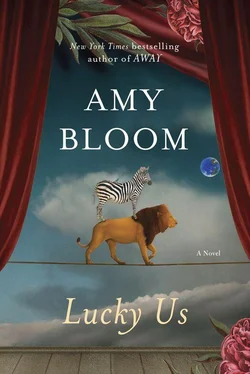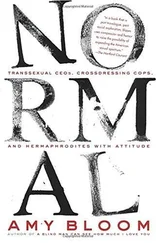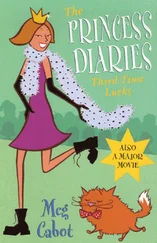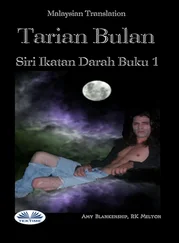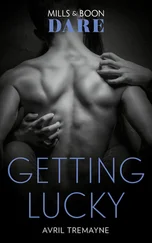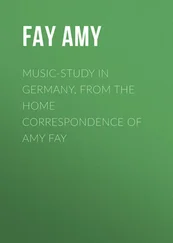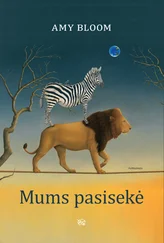Clara Williams unbuttoned her blouse and Ruthie got goose bumps.
When she was a grown woman and had learned to look through white people like they weren’t there, had learned to close her ears to the murmurs of black men sitting on stoops and white men passing on the street, their brows lowered over pale, hot eyes, long after she’d memorized the poetry of Nikki Giovanni and could quote Angela Davis on freedom like she’d sat at the sister’s right hand in a previous life, when someone referred to “people of color,” she would think of Clara Williams stroking foundation down her rounded, colorless arms until they turned a pinkish tan, pulling a compact from her emerald-green purse and powdering her now-pink arms, from armpit to fingertip, paying extra attention to the crooks of her arms, pushing the powder into her skin.
Ruthie and Danny watched Clara Williams come out of the bathroom. She put on her red lipstick and smoothed her eyebrows and snapped her compact closed. She twisted the gold clasp on her purse, and Ruthie and Danny threw themselves back on the rug in Danny’s room. Ruthie thought that Clara Williams might check up on them, and she glued her eyes to Betty and Veronica in the comics, joyriding.
CLARA WASN’T ENTIRELY READY FOR GOOD-BYE. SHE’D COME UP the walk with a bouquet of flowers Edgar wouldn’t see and a Dutch oven of soup he wouldn’t eat, and Danny watched her struggle and went to find his baseball under the hedges. She forgave him for not helping her. He would miss her, and she would miss him in a different way, and his way was worse. She handed Eva the flowers and the soup and went upstairs.
She shook her head until her neck was loose, and when she composed herself, she looked toward Edgar. It wasn’t really Edgar anymore. It was just a shell, but it was terrible to leave even his shell. One evening at the Nite Cap, when Edgar was still well and had just got paid and it seemed to everyone there that Clara was, that night, about to knock Ella Fitzgerald right off her high horse, Edgar had put a milk-glass vase of white roses on the piano.
“Marry me,” he’d said that night.

SHE’D SAT AT THE foot of his bed, grateful and sorry that she’d let Ozzie drop her off. She should have kept Ozzie out of it. It was shaming to Edgar, not that he knew. It was shaming to both men. She didn’t want to stay. She felt for Danny and Eva and she hoped things would get better for both of them, and she had no wish to be part of what happened next. She was almost middle-aged and had been loved by an interesting man and was now loved by a better one, a man who would be around for a long while and love her until they were old people, rocking on the porch. Clara couldn’t picture rocking on any porch, anywhere, with Edgar. Ozzie might not make her laugh the way Edgar did, but she could do without. She could amuse herself.
Bei mir bist du schoen, it’s such an old refrain,
And yet I should explain …

EDGAR ACTON, NÉ ISADOR VOGEL, DIED ON TUESDAY. THEY BURIED him on Thursday. Clara left on Sunday.
During the funeral, Clara thought about the packing she had to do. It was relaxing to have the bits of Hebrew, which meant nothing to anyone, making an odd, old music of their own, and it was good to have the rabbi for comic relief. He was like no rabbi Clara had ever seen, thin, American, eager to please. Mrs. Torelli was there, in dark-gray silk, for all the Torellis. Danny was a drooping pile of clothes, and she saw Eva pull him up gently a few times and he sank as soon as Eva’d turned back to face the pulpit. Neither of them cried. After the funeral, Eva hid the Torellis’ giant ham in her room so as not to offend Mr. Smedresman, who’d brought the bagels and lox and four kinds of herring, and that’s what people ate. The big Mexican makeup man they all loved brought a tower of Italian cookies and took Danny for a walk. When they got back, Danny’s little Ruthie had come by with her impeccable mother, and the woman eyed Clara until she’d moved under Ozzie’s big arm, protecting herself. Mrs. Post left a casserole of macaroni and cheese on the table, hugged Danny, patted Eva on the shoulder, and pushed Ruthie out the door.
The day after Edgar’s funeral, Clara helped Eva pack up his clothes and belongings. She had two more days before she and Ozzie would jump into his big, clean car and drive west to Detroit. She and Eva walked Edgar’s worn clothes and worse underwear to the bin behind the AME Zion Church. Eva asked if she’d thought Danny would recover. Clara said that she thought that depended on Danny’s nature, that some people bounced back from a train wreck and some people couldn’t get over a bee sting. They dumped the clothes and Clara offered Eva a cigarette.
“Ozzie wants to marry me,” she said. “In Detroit.”
“Absolutely,” Eva said, and she ground the cigarette out on the brick wall behind them.
OZZIE DROVE SLOWLY THROUGH Great Neck and then faster and with purpose, the summer dust flying behind them, a little of it settling like brown talc on her dress and in Ozzie’s hair. Clara touched his thigh, like a steel spring under her hand. They drove to Detroit in three days. Ozzie listened to the radio, Clara thought her thoughts. Edgar would lie like a white field of bits and bone just beneath the green layers of her life, for the rest of her life. She’d hear a deep English baritone on the radio or a white man holding forth somewhere, the way men do, or see a picture of John Barrymore, who Edgar must have copied, right down to the white wings at the edge of the dark, glossy hair, and Edgar would pop up right beside her.
Now all she wanted was to put some serious distance between her and his funeral. She made Ozzie stop for pie at the first farm stand they came to.
IN HER OLD AGE, her color was almost all gone. The only brown left was a thin ribbon of it around her neck, but she kept up with the ultraviolet light because she felt good afterward; she didn’t feel hopeful, the way she had when she was a girl, but she liked the doctor. She had a black dermatologist and she told everyone about him.
It was hard to go from relaxed (if you call hot acid relaxing) hair to natural, and the first haircut left her feeling naked, but from the first time she saw those beautiful Negro girls on television, their hair explosions of self, big, beautiful treetops above their bright faces, she’d been thinking, Let me have a little of that. She found herself a young woman to do her hair and she liked the beauty parlor. They loved her enthusiasm and she loved their acceptance. On Sunday mornings, she did a little gardening and she thought about writing to Danny, and even to Iris and Eva, but it’d been too long. She pictured Danny with no trouble. She saw young men like him all the time at the library, sometimes at the movies. He’d have longish hair and those crazy bell-bottom pants and a bright-yellow shirt, blue aviator glasses, and maybe a leather peace sign around his skinny neck. In her imagination, Danny was slim and smooth, bouncing in his Beatle boots, but things might not have worked out so well. He might be pudgy, with thick glasses and facial hair that looked like something from between your legs. One time, she’d taken Danny into town on her errands and a good-looking Negro man stopped to say that she looked like Miss Lena Horne. Danny pulled himself up to the man’s rib cage, adjusted his glasses, and said, Oh, mister, I don’t think Lena Horne can hold a candle to Miss Clara Williams. Danny had been her little man, and she should have made more of him.
Читать дальше
